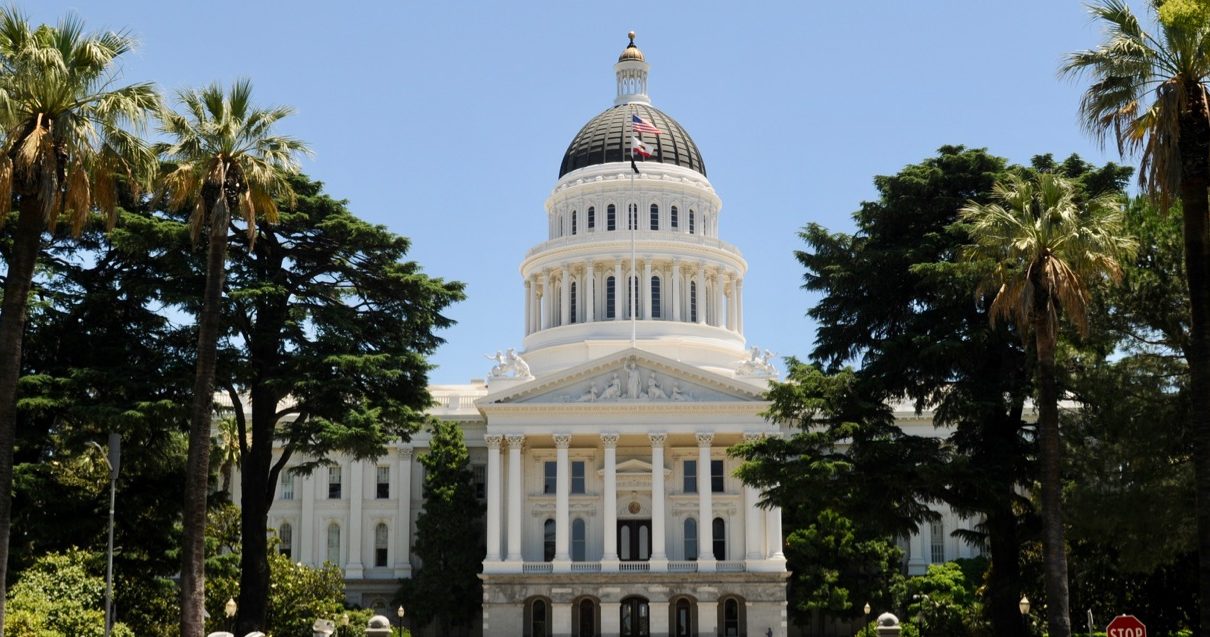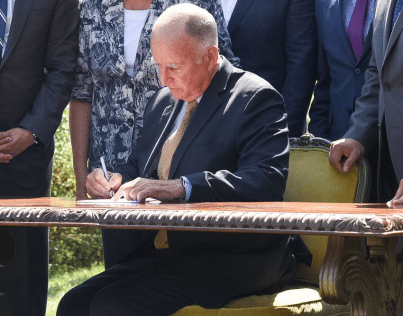
California State Capitol. (Photo: Kevin Sanders for California Globe)
What Are the Different Roles of the Governor of the State of California?
The Governor can require executive branch officials and employees to provide information related to their duties
By Chris Micheli, November 6, 2021 8:12 pm
The Governor of the State of California has multiple formal and informal roles. The formal roles are set forth in several sections of Article V of the state Constitution. The following are the duties and powers granted to the Governor:
For example, the Governor is required to make an annual report to the Legislature on the condition of the State. This is referred to as the Governor’s “State of the State” address. (Section 3)
The Governor can require executive branch officials and their employees to provide information related to their duties. (Section 4)
The Governor is permitted to make appointments to fill vacancies in offices, including those of the other constitutional officers of the state (except Insurance Commissioner). (Section 5)
The Governor is provided authority through statute to assign and reorganize the functions of executive branch officers and agencies, and their employees, except this does not apply to other elected offices and agencies administered by them. This is referred to as a “Governor’s Reorganization Plan” or “GRP.” (Section 6)
The Governor is the commander in chief of the state’s militia and the Governor is granted authority to call the militia into use to enforce the laws. (Section 7)
The Governor is provided authority to grant a reprieve, pardon, or commutation, except in cases of impeachment. The Governor is given authority to review the decisions of the parole authority for those convicted of murder. (Section 8)
In addition to these constitutional provisions, there are multiple sections of the California Government Code applicable to the Governor. These are found in Government Code Sections 12001 to 12091. The following are the main duties and powers granted to the Governor:
The Governor may appoint and fix the salaries of his or her assistants and other personnel. (Section 12001)
The Governor is required to appoint a person to represent the State of California in Washington, D.C. (Section 12001.5)
The State’s Washington, D.C. representative is required to provide an annual report to the Senate Secretary and Assembly Chief Clerk. (Section 12001.7)
The Governor is required to supervise the official conduct of all executive and ministerial officers of the executive branch of government. (Section 12010)
The Governor is required to determine the distribution in the executive agencies of deputies or employees selected pursuant to civil-service-exempt officers appointed by the Governor. (Section 12010.5)
The Governor may designate as exempt from civil service position in the executive branch agencies over which he has line responsibility and which have civil-service-exempt officers and employees. (Section 12010.6)
The Governor is required to ensure that all offices are filled and their duties are performed. (Section 12011)
The Governor, in the event of a judicial office vacancy, is required to submit to a designated agency of the State Bar of California the names of all potential appointees or nominees for judicial office for evaluation of their judicial qualifications. (Section 12011.5)
The Governor is the sole official organ of communication between the government of California and the government of any other state or of the United States. (Section 12012)
The Governor or a designee is authorized to give state approval to the transfer of offenders between the U.S. and a foreign country as provided by a treaty. (Section 12012.1)
The Governor may direct the Attorney General to appear on behalf of the State of California and may employ additional legal counsel for cases against the state. (Section 12013)
The Governor may require the Attorney General or a district attorney to inquire into the affairs or management of any corporation authorized under state law. (Section 12014)
The Governor may appoint for no more than 60 days after the conclusion of the Governor’s term persons to assist the Governor in concluding matters arising out of official duties during the final term in office. (Section 12015.5)
The Governor is required to report to the Legislature each session any reprieves, pardons, and commutations granted. (Section 12017)
The Governor may designate which single state agency is responsible for each federal program in which federal money is given to the state. (Section 12018)
The Governor is required to keep registers related to applications for pardons or commutations, statements made to him or her in capital cases, and all appointments made by him or her. (Section 12030)
The Governor is required to keep accounts of all official expenses and disbursements and all rewards offered by the Governor. (Section 12031)
The Governor is required to prepare and maintain an Open Central Registry of Appointive Offices, which is known as the State Appointments List, and that is available to the general public is specified locations. (Section 12032)
The Governor is required to make copies of all information on the State Appointments List and updated materials. (Section 12033.2)
- Director of Child Support Services - January 26, 2026
- Methods of Taking - January 26, 2026
- Time Limitations for Arbitration Awards - January 25, 2026





End Newsom’s emergency powers TODAY. Future emergency powers should be limited to 30 days, and the legislature must approve extensions every 30 days for a maximum of 2 extensions. No more unending emergency powers for governors to become a dictator.
What ever happened to the
California stimulus?
I haven’t got any California stimulus.
My husband gets ssi for being
Disabled and my disability ssi turned in retirement and we only get less than 2500.00 a month.our rent is 1000.00
A month
We are always out of money after paying bills and prescriptions…not much
For groceries after bills.